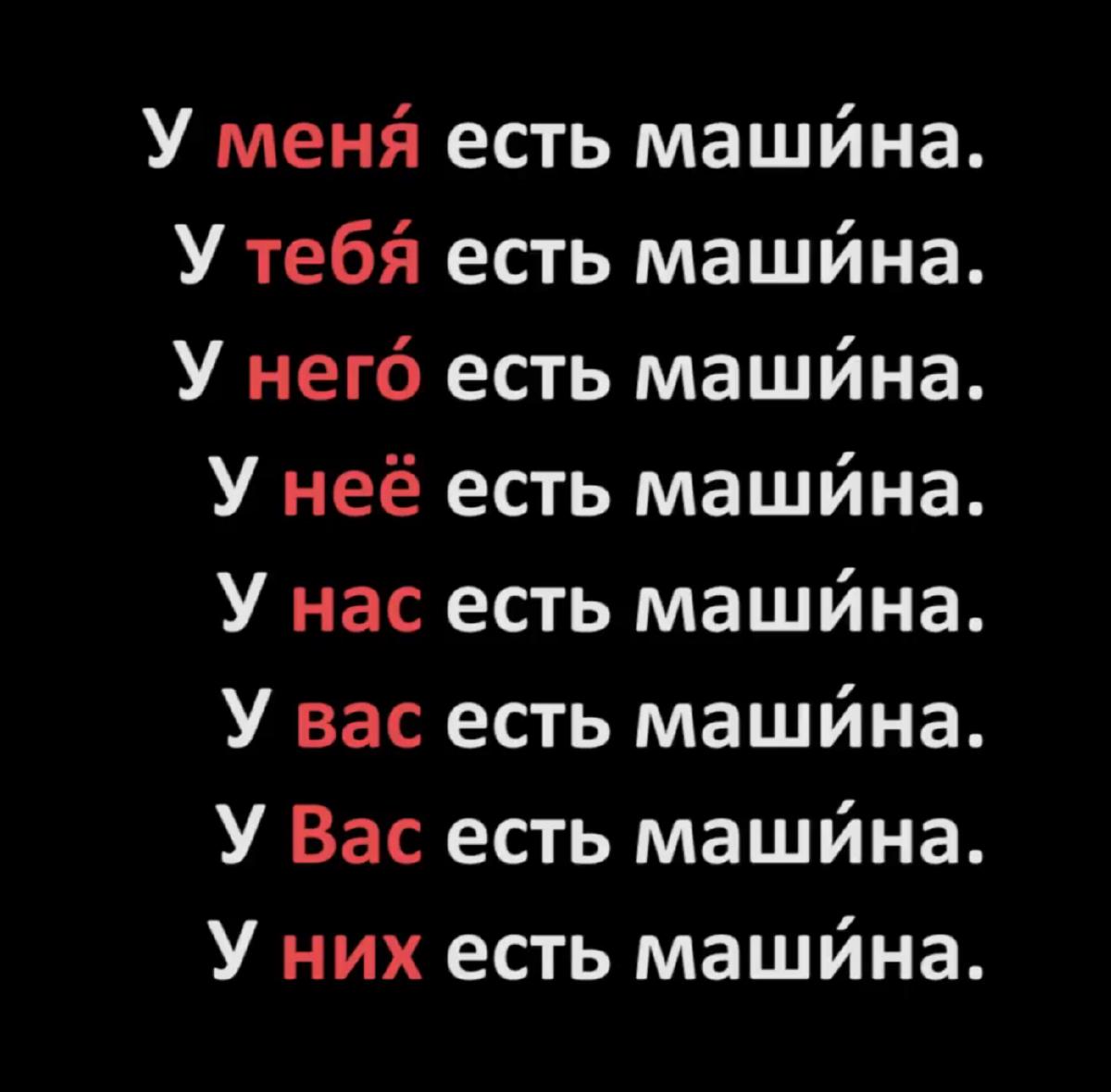To have, to have, to have
Knowledge you want to have: the verb ‘to have’ technically doesn’t exist in Russian. Of course, there are ways to express possession, but it’s done a bit differently than in many other languages. Somewhat indirectly. Less possessive. Or: a bit more lyrical.
у … есть
Literally, a Russian doesn’t say “I have,” but rather “by me is.” For that “by,” you use у, “is” becomes есть, and in between comes the personal pronoun in the genitive (
second case). This turns я (I) into меня.
Nominative
You don’t have to do anything with the word that follows (the possession). In other words, the nominative (first case) applies to it.
I have a car: у меня есть машина.
You have a house: у тебя есть дом.
у + genitive
The у is always followed by the genitive. This applies to nouns and names as well.
The car (машина) has a steering wheel: у машины есть руль.
The house (дом) has a roof: у дома есть крыша.
Viktor (Виктор) has a guitar: у Виктора есть гитара.
Amsterdam (Амстердам) has canals: у Амстердама есть каналы.
See
Meaning of У in Russian Language (Be Fluent in Russian, 2018, 6 m).
его/него, её/неё
For “he has” and “she has,” a н is added to его and её (у него, у неё). Learn more in У неё? у её? When to add the н- in Russian (Russian grammar, 2020, 7 m) and У меня, у тебя, у вас, у них, у неё, у него (русский с носителем, 2019, 6 m).
Absence
The rules change slightly when expressing that you don’t have something. есть becomes нет (no/not/none), and what follows is in the genitive case, just like after у.
I don’t have a car: у меня нет машины.
You don’t have a house: у тебя нет дома.
See ‘Absence’ under second case, plus:
- The construction “I have” “I haven’t” in Russian (Russian Up, 2020, 12 m)
- У меня есть & У меня нет. Common mistake in Russian (Daria Mikhay, 2018, 5 m)
- У меня нет… родительный падеж обучение русскому языку иностранцев (РКИ для всех, 2016, 9 m)
With and without есть
When the possession is not very concrete or tangible, you omit есть. It’s also unnecessary when the possession is already known or assumed. For example, when you want to say something about that possession. “I have a big car,” spoken to someone who already knows you have a car, where the main message is that the car is big: у меня большая машина. A better translation might be: “My car is big.”
- When to say есть and when not to say есть (Help my Russian, 2018, 5 m)
- У меня или у меня есть? (русский с носителем, 2018, 3 m)
- У меня есть vs у меня (Be Fluent in Russian, 2017, 7 m)
иметь vs есть
Russian does have the verb
иметь, meaning to have or own. There are key differences, including grammatical ones. Compare у меня есть работа and я имею работу. With иметь, the accusative case follows, indicating that something is happening to работа (work). It can sound vulgar when referring to living beings. Alfia explains it in
Learn Russian: verb have – иметь (2019, 10 m). Also see
The Difference of Using Есть and Иметь (LearnRussianLanguage.net, 2018). Verb conjugations and example sentences
here.
More есть
Besides “to be,” есть also means “to eat.” This brings you to Crazy Russian: есть есть? (русский с носителем, 2020, 4 m). See also the Russian Verb Conjugation, with examples and a quiz. То есть is something different again. Fedor from Be Fluent in Russian explains.
Indicating having something. Part 1
(Amazing Russian, 2020, 12 m)
From the same channel: Indicating Having Something | Диалог: В кафе (2020, 9 m).
“To have” У меня есть
(College Russian, 2018, 7 m)
Verb “to have” in Russian
(Ru-Land Club, 2017, 8 m)
From the same channel:
-
How to say “I don’t have smth” in Russian? Endings of genitive case (2018, 12 m)
-
When to omit есть in the structure I have in Russian (2018, 23 m)
- Verb “to have” in Russian in Past and Future tenses (2017, 7 m)
How to Say “I Have” in Russian (part 1) / У меня есть
(Russian with Russian, 2017, 6 m)
Part 2:
Omission of “есть” (2017, 9 m)
Past tense in
Part 3; future tense in
Part 4.
Help/reference
- Expressing ’to have’ (Auburn University)
- How to say ‘I have’ in Russian (Learn Russian Step by Step)
- Indicating Having And Not Having Something. Genitive Case of Personal Pronouns (Russian for Everyone)
last updated 27-12-2020
More








